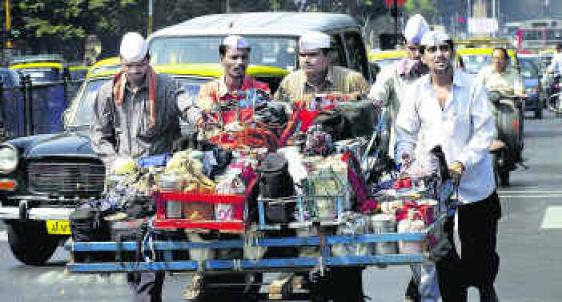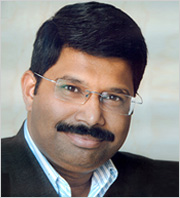
The Birla Institute of Management Technology (BIMTECH) and Education Promotion Society of India (EPSI) in collaboration with Birla Alumni Associations’ Network (BANN) even organized an interactive session on “Dabbawalas of Mumbai: The Success story” at New Delhi’s PHD Chambers of Commerce and Industry, New Delhi on 23rd August last year.
Special invitees Raghunath Megde and Gangaram Talekar, president and general secretary of Nutan Mumbai Tiffin Box Suppliers Association respectively, related their first-hand experience of the complex logistics system they have to follow -- to an audience comprising students, teachers and officials from the corporate world. In their engrossing talk, lasting close to two hours, they spoke about the organizational structure, working style, and delivery system.
The Mumbai dabbawala system has been around since 1890. Today, the daily job of the dabbawalas is to deliver over two lakh tiffin boxes all around Mumbai. Talekar made humorous references to the “Thumbs Up” status of the workforce – a reference to their illiteracy – and also to the irrelevance of certifications to the dabbawala who would rather get on with his job of delivering his dabba to the satisfaction of his customer, than pursue a degree to educate himself!
Megde said that for the dabbawala, the customer was a greater king than any other royal representative.
Harivansh Chaturvedi, director BIMTECH, felt that the Mumbai dabbawalas are a great source of inspiration. “We need to understand their systems that lead to such highly efficient performance.”
The basic philosophy of the business, according Talekar, is 0 % fuel, 0 % investment, 0 % modern technology, 0 % Disputes, 99.9999% performance 100 % customer satisfaction. “Our computer is our head which we protect through our Gandhi topi,” he joked.
The dabbawalas’ error rate is reported to be just one in 16 million deliveries. ‘Forbes’ magazine gave them a Six Sigma rating of 99.9999999 percent for this accuracy in 2001!! Dutch filmmakers Jascha De Wilde and Chris Relleke made a documentary in 1996 called Dabbawalas, Mumbai’s Unique Lunch Service. The Christian Science Monitor published an article, ‘Fastest Food: It’s Big Mac vs Bombay’s Dabbawalas’ in 2001.
What’s more, a few dabbawalas also got an invitation from Prince Charles to go to England to attend his wedding with Camilla Parker in 2005!
While they have managed to achieve this fantastic accuracy rating, the complexities involved in the logistics and supply chain management system followed by dabbawalas has become a subject of study for educational institutions and think tanks around the world.
Megde and Talekar elaborated on the methodology: The network operates on a meticulously planned and precise manner using a zoning system approach that consists of several teams, each team supervised by a “mukadam”. As he said, “Like for you, you have a boss or sir, in our team the senior is called a mukadam. They are more experienced, who are familiar with the colors and coding used in the complex logistics process.”
The city’s network of local trains is used in the delivery process, as also bicycles and carts, besides the physical ferrying of large wooden crates of dabbas weighing 65-70 kg on the heads of the dabbawalas. For his efforts, the dabbawala, who is also a “shareholder” in the Association, earns an average salary of Rs 5,000 per month. The Association has started inviting “dabba booking”: a Mumbai resident can now just SMS 3636 to avail the services of pick and drop of tiffin-boxes. There’s also an official website www.mydabbawala.com to keep up with the changing times (though the Association still aims to keep operational costs low as that has been its USP). “Through our website, management students can easily get to know about our logistics and supply chain management system which nowadays is part of their study course,” said Talekar.
The Association’s representatives spoke about the recognition that their organization has received, especially after Prince Charles’ visit to the Mumbai Churchgate Station to interact with them, and after their Six Sigma certification.
For their part, the dabbawalas are convinced that they are the “Annadatas” or providers of food. Their motivation stems from the desire to ensure that no individual subscribing to their service (the ‘customers’) should go hungry on any working day. Though their logistics and delivery process can be interpreted as a “hub and spoke system”, or even Just-in-Time and Network Management, one cannot find an equivalent in management parlance to their motivational tools.
As we know, logistics is the new mantra for building competitive advantage, the world over. Mumbai’s dabbawalas, it would seem, developed their homegrown version long before the term was coined.



























